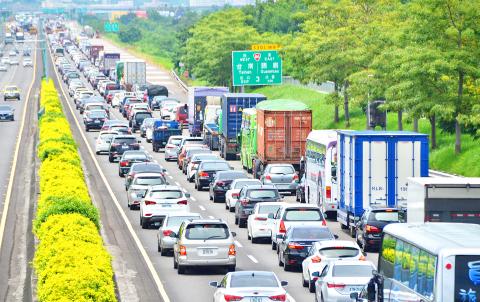The Freeway Bureau yesterday announced a series of measures to facilitate freeway traffic during the Lunar New Year holiday, with the highest traffic volume expected on Feb. 7, the fourth day of the holiday.
Southbound freeway traffic would be heavy from Lunar New Year’s Eve to noon on Feb. 7, bureau Deputy Director-General Wu Mu-fu (吳木富) said.
Starting in the afternoon on the fourth day of the holiday, northbound traffic would become heavier, he said.

Photo: Wu Chun-feng, Taipei Times
The holiday lasts from Feb. 2 to Feb. 10, including the two weekends before and after the five-day holiday.
Southbound traffic would be heavy from Feb. 5 to Feb. 7, the bureau said, adding that the heaviest southbound traffic is expected on Feb. 6, with the traffic volume potentially reaching 71 million vehicle kilometers (MVK).
Feb. 6, the third day of the holiday, is traditionally when married couples visit the wife’s parents.
Northbound traffic is to be heavy from Feb. 7 to Feb. 9, with the heaviest traffic expected on Feb. 8, possibly reaching 76MVK, the bureau said.
The total traffic volume on Feb. 7 could top 140MVK, which would beat the record of 138MVK set on the third day of the 2017 Lunar New Year holiday, the bureau said.
A series of measures to facilitate freeway traffic is to be enforced, Wu said.
In addition to regular toll-free hours between 12am and 5am, a high-occupancy vehicle policy — which requires that each car carry at least three passengers on freeways — would be implemented from 1pm to 6pm on Feb. 7 and Feb. 8 on the northbound lanes of the National Sun Yat-Sen Freeway (Freeway No. 1) and Formosa Freeway (Freeway No. 3), Wu said.
On the Chiang Wei-Shui Freeway (Freeway No. 5), high-occupancy vehicle hours would be implemented on the southbound lanes between 7am and 12pm from Feb. 5 to Feb. 7, he said.
From Feb. 7 to Feb. 10, the high-occupancy hours on Freeway No. 5 would be enforced on the northbound lane from 2pm to 9pm, he added.
In related news, the Tourism Bureau is planning to expand the domestic travel subsidy program to include subsidies during low-travel seasons and weekdays, following a proposal President Tsai Ing-wen (蔡英文) put forward at the end of last year, Tourism Bureau Director-General Chou Yung-hui (周永暉) said.
According to the bureau’s preliminary plan, the subsidies would be awarded to tourists traveling domestically between April and June, as well as between October and November, which are the nation’s off-peak travel seasons, Chou said, adding that the subsidies would be only part of the program.
“We hope to first talk to local government officials in a seminar on Jan. 23 to get some ideas. We will also spend two to three months talking to tourism operators nationwide about how to motivate people to travel during the off-peak seasons,” Chou said.
The agency would also evaluate the performance of the winter travel subsidy program, which ends at the end of this month, he added.

Trips for more than 100,000 international and domestic air travelers could be disrupted as China launches a military exercise around Taiwan today, Taiwan’s Civil Aviation Administration (CAA) said yesterday. The exercise could affect nearly 900 flights scheduled to enter the Taipei Flight Information Region (FIR) during the exercise window, it added. A notice issued by the Chinese Civil Aviation Administration showed there would be seven temporary zones around the Taiwan Strait which would be used for live-fire exercises, lasting from 8am to 6pm today. All aircraft are prohibited from entering during exercise, it says. Taipei FIR has 14 international air routes and

The Ministry of National Defense (MND) today released images of the military tracking China’s People's Liberation Army (PLA) movements during the latest round of Chinese drills around Taiwan. The PLA began "Justice Mission 2025" drills today, carrying out live-fire drills, simulated strikes on land and maritime targets, and exercises to blockade the nation's main ports. The exercises are to continue tomorrow, with the PLA announcing sea and air space restrictions for five zones around Taiwan for 10 hours starting from 8:30am. The ministry today released images showing a Chinese J-16 fighter jet tracked by a F-16V Block 20 jet and the

Snow fell on Yushan (Jade Mountain, 玉山) yesterday morning as a continental cold air mass sent temperatures below freezing on Taiwan’s tallest peak, the Central Weather Administration (CWA) said. Snowflakes were seen on Yushan’s north peak from 6:28am to 6:38am, but they did not fully cover the ground and no accumulation was recorded, the CWA said. As of 7:42am, the lowest temperature recorded across Taiwan was minus-5.5°C at Yushan’s Fengkou observatory and minus-4.7°C at the Yushan observatory, CWA data showed. On Hehuanshan (合歡山) in Nantou County, a low of 1.3°C was recorded at 6:39pm, when ice pellets fell at Songsyue Lodge (松雪樓), a

City buses in Taipei and New Taipei City, as well as the Taipei MRT, would on Saturday begin accepting QR code payments from five electronic payment providers, the Taipei Department of Transportation said yesterday. The new option would allow passengers to use the “transportation QR code” feature from EasyWallet, iPass Money, iCash Pay, Jkopay or PXPay Plus. Passengers should open their preferred electronic payment app, select the “transportation code” — not the regular payment code — unlock it, and scan the code at ticket readers or gates, General Planning Division Director-General Liu Kuo-chu (劉國著) said. People should move through the